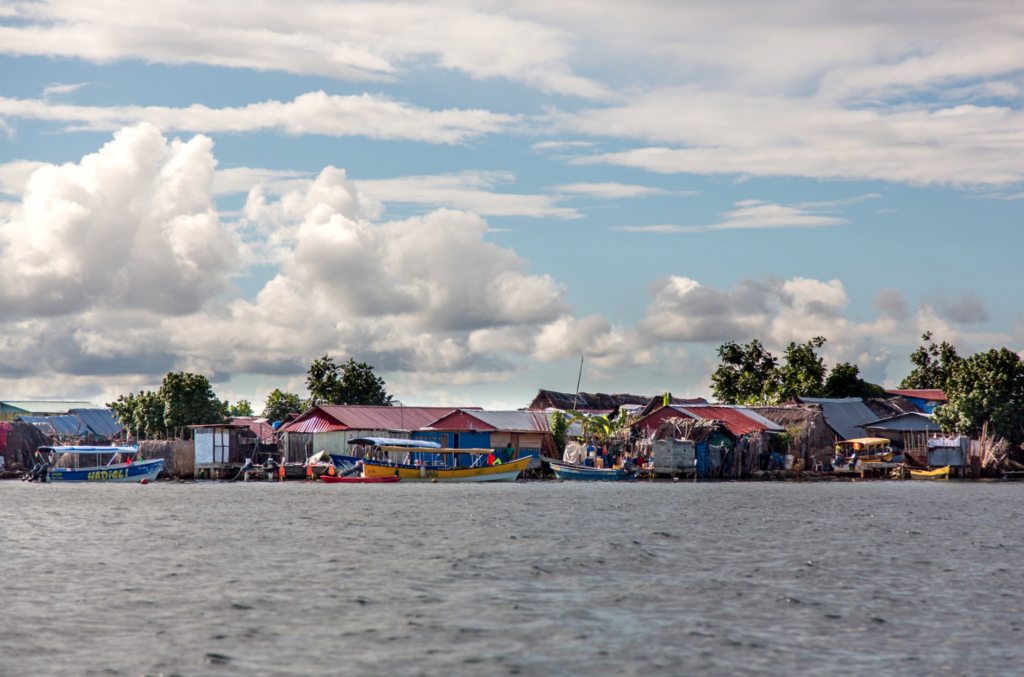As the world grapples with the reality of climate change, Panama faces an acute and immediate crisis: entire communities are being displaced as rising sea levels threaten to submerge their homes. This is the stark reality for the residents of Gardi Sugdub, a tiny island off Panama’s Caribbean coast, and the first of 63 communities along Panama’s coasts expected to be relocated in the coming decades due rising sea levels.
For the Gunas, who have lived on the island for over 200 years, the sea is not just a backdrop but an integral part of their identity, economy, and culture. The forced relocation to the mainland, despite being a mere eight-minute boat ride away, represents a seismic shift in their way of life.
While moving to the mainland may provide temporary relief for the affected families, it is not a sustainable, long-term solution. Relocation disrupts the social fabric of communities, severs ties to traditional livelihoods, and places an undue burden on those least responsible for the climate crisis. The plight of the Gunas mirrors that of climate refugees worldwide, highlighting the need for comprehensive policies that address the root causes of displacement and provide support for those forced to abandon their homes.
Fishing and tourism, the economic lifeblood of these communities, are deeply intertwined with their maritime environment. Moving inland means not just abandoning homes but an entire way of life. Panama’s economy, significantly reliant on fishing and tourism, faces an uncertain future as climate change continues to wreak havoc. The warming oceans not only contribute to rising sea levels but also affect fish populations and coral reefs, jeopardizing the livelihoods of many Panamanians. Tourism, too, is at risk as the natural beauty that draws visitors becomes increasingly threatened by environmental changes.
Creating systemic and sustained change

Confronting the complex challenges posed by climate change requires visionary leadership and a willingness to embrace systemic ways of thinking. Rather than reacting to crises as they unfold, we need proactive strategies that address the underlying drivers of climate change and prioritize the needs of the most vulnerable. This entails a global effort to reduce greenhouse gas emissions, promote renewable energy, and foster resilient communities capable of withstanding the impacts of a changing climate.
Furthermore, as the international community grapples with the growing number of climate refugees, it is crucial that we develop compassionate and equitable policies that uphold the rights and dignity of those displaced by environmental disasters. This includes providing adequate resources for resettlement, ensuring access to essential services, and creating opportunities for meaningful participation in decision-making processes.
The story of Gardi Sugdub is a stark reminder that climate change is not a distant threat but a reality unfolding before our eyes. The disproportionate impact of climate change on vulnerable communities like Gardi Sugdub underscores the urgent need for systemic solutions that prioritize the rights and dignity of those most affected. We aspire to create a world where communities in vulnerable circumstances are shielded from the consequences of climate change, and where international cooperation drives ambitious climate action to secure a sustainable future for all. As we witness the unraveling of communities and the disruption of lives, we must recognize our shared responsibility to act with urgency and compassion. Through cultivating compassion, we can find the courage and strength to take the bold actions necessary to build a more just and sustainable future for all. By embracing systemic solutions, investing in sustainable development, and prioritizing the needs of the most vulnerable, we can chart a course towards a more just and resilient future for all. The challenges faced by Gardi Sugdub are warning of what lies ahead if we fail to act – let us heed this warning and work tirelessly to build a future where all communities can thrive in the face of a changing climate.
